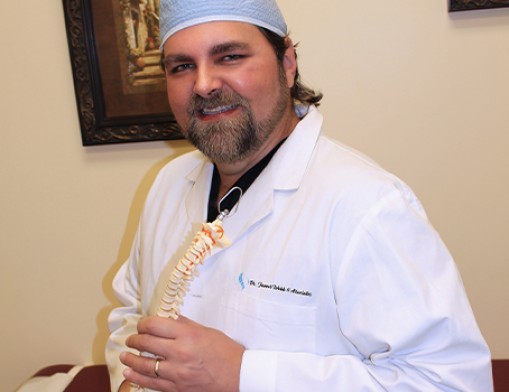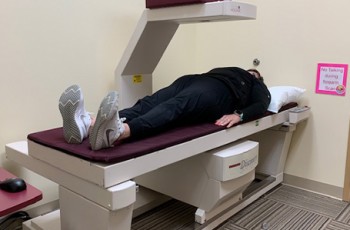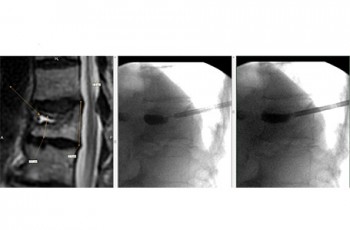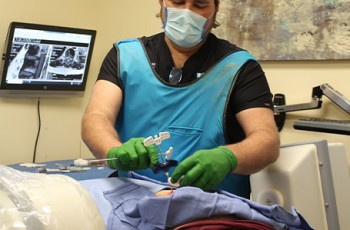Dr. James Webb Specializes in Helping Complex Back Pain
By: Value News | Category: Health & Fitness | Issue: June 2021

Dr. James Webb.
Osteoporosis can be as deadly as heart disease. In the 1980s, the disease was naturally considered a normal process of aging. As medicine evolved, it became evident that Osteoporosis was connected to fractures. Today, medicine shows that not everyone with Osteoporosis has low bone density and people can have ‘fragility fractures’ as a result of the disease’s progression.
“There are thousands of doctors who do kyphoplasty in the U.S. and very few actually treat the underlying osteoporosis. As an interventional musculoskeletal radiologist, there are very few of us who actually focus on treating osteoporosis and not just fixing fractures. I was the first in Oklahoma to have a free-standing clinic focused on treating osteoporosis, not just the fractures with kyphoplasty, but medically treating the underlying osteoporosis.
There are probably less than 20 doctors around the country that I know that do this to the high degree that we do,” explained Dr. Webb.
Though the majority of Osteoporosis patients are over 60, he has treated patients as young as 18, and many in their 30s. He is helping drive research for vertebral fractures.

Bone densitometry, also called dual-energy X-ray absorptiometry, DEXA or DXA, uses a very small dose of ionizing radiation to produce pictures of the inside of the body (usually the lower (or lumbar) spine and hips) to measure bone loss. It is commonly used to diagnose osteoporosis, to assess an individual’s risk for developing osteoporotic fractures. DXA is simple, quick and noninvasive. It’s also the most commonly used and the most standard method for diagnosing osteoporosis.
Dr. Webb is offering free bone density scans to qualified patients to improve access to care as well as raise awareness of the disease.
“Most people hear the word ‘osteoporosis’ and they think of a ninety-year-old grandmother with a hip fracture.
Unfortunately, problems with bone health can impact younger patients and it also affects men.” Webb said.
“Like heart disease or a stroke, people think it can’t happen to them until it’s too late. Fractures from bad bone health are a common cause of misdiagnosed back pain. If you’re concerned about your bone health, or you have back pain that no one has been able to help, give us a call.”
Interested participants should call the Dr. James Webb & Associates office at 918-260-9322 for a pre-screening. Priority will be given to those who have fallen and broken a bone, have a family history of osteoporosis, or take certain medications proven to reduce bone density. Pre-screening is needed to make sure that the test is medically indicated as well as to avoid regulatory hurdles.
“I really wanted to offer free screening to all patients who needed it--to raise awareness of bone health and to give back to this community that has been so supportive of us,” Webb says. “Unfortunately, government and insurance regulations actually won’t allow us to do that, so our focus is really for uninsured patients who need bone density testing”
Osteoporosis occurs when the body’s bones become weak from low bone density, low bone quality, or both.
As a result, bones become weak and may break from a fall or, in serious cases, from something as slight as sneezing or minor bumps. Most often, osteoporosis is a silent killer until a fracture occurs.
“There is hope for slowing down and even reversing the effects of bad bone health,” said Webb.
“The key is to catch it as early as possible and then treat it medically to reduce the risk of future fractures.”
Osteoporosis is often underdiagnosed. At least once a month he sees a patient who has been told they don’t have osteoporosis when in fact they do have the disease.
One of the ways doctors screen is by using a DEXA bone density scan. This test does two things: Screens for risk in asymptomatic people; and helps determine if a person’s bone density is low enough to be put on medication. Screening is good if you have a family history or any concern about Osteoporosis.
Essentially, a bone density scan compares bone density to the bones of an average healthy young adult.
The test results can help determine if you have osteoporosis, are at risk for it, and can be used to determine the overall risk for having a fracture.
“Advanced CT scans and X-ray’s can miss half the fractures; and two-thirds of the unfound vertebral fractures heal before they receive medical treatment,” explained Dr. Webb. “A physical exam is the most technical way to detect a fracture. We treat the patient and not the imaging because we know that many fractures are painful for weeks before we can detect the collapse on imaging.” He specializes in innovative less invasive treatments to treat Osteoporosis and fractures before they become severe. He uses a variety of treatments including kyphoplasty, steroid injections, ablations and other pain-relieving procedures.
Dr. Webb – Kyphoplasty Expert in back pain relief, treating old and new injuries...focuses on finding the underlying cause of back pain in patients and providing targeted, minimally invasive treatment.
Kyphoplasty is a minimally invasive procedure that quickly repairs vertebral compression fractures (VCF) and restores structural integrity to broken vertebral bone. It is an outpatient procedure that uses a cavity creation device (usually a balloon) to create a space in the broken vertebra which is then filled with a special bone cement to stabilize the fracture and reduce pain. Dr. Webb is one of the most experienced physicians in the United States and has performed thousands of these procedures.
Patients Appreciate Dr.Webb’s Staff, Expertise and Pain Relieving Treatments
Dorothy
For Dorothy, it was a long road to be seen by a doctor, get an MRI, figure out what’s wrong and derailed several times due to insurance circumstances and ‘medical judgment.’ From the beginning of her fall from a ladder, November 2014, she had been to several doctors who said that she would have to live with and manage the pain because there was nothing that could be done. The experience of losing height and managing her chronic pain from vertebral fractures from her fall were agonizing for nearly six years until late February 2020 when she found Dr. James Webb and his expertise in Kyphoplasty.
Dr. Webb’s staff arranged for Dorothy to be seen within a week of her call. They expeditiously scheduled her for an MRI March 3, and she had her first procedure by March 10. Dorothy is now in her fourth treatment and for the first time since the accident, her compressed spine has straightened and her pain, thus far, has been reduced by 75 percent which has made her life incredibly better. Her struggle to find the care she needed had finally arrived.
Marvett
In 2004, Marvet’s life was dramatically changed after a life-altering auto accident. She suffered from multiple broken vertebrae, a broken neck, shattered left forearm and head lacerations. Marvet was used to living a highly social lifestyle; working in a busy office, taking care of family and friends, exercising and enjoying life. Later, as her life progressed, her life came to an altering halt. The pain she was experiencing progressed too; and her problems were exacerbated by osteoporosis.
She had surgeries. Prescriptions and pain medicines worked less and less. Doctors and specialists were out of ideas on how to help her other than by using pain medications. By 2014, Marvet, described herself as going into a hole. At this point she was wearing a back brace full-time; she mostly consigned herself to stay home. “Walking across a room was excruciating. I gained weight and was fully depressed,” said Marvet. “The last straw was when she took a fall.” In more severe pain than ever, she said, “I tried my best to find self-help and discontinued all pain medications.”
January 2015, Marvet’s husband heard about Dr. Webb’s osteoporosis treatments. “We called Dr. Webb’s office for an appointment. He immediately sent me for an MRI, checked my bone density, and calcium. My diagnosis was 7 fractures. My treatment began two weeks later. It was so nice to be treated so well. I finally had people around me who understood what I was going through and helped me. My pain relief from my fractures came within about two weeks after beginning my kyphoplasty and osteoporosis treatments. I trust him. He and his staff treat me with great respect and dignity. I have found more help here than any other place over the years of suffering. It has been worth the drive to see Dr. Webb.”
Dwain
2020 for Dwain Garrison has been a time of discovery and healing. For over one and half years, Dwain suffered from severe chest and shoulder pain. He had been an athlete most of his life and lived the rough and tumble lifestyle that most athletes endure.
“I felt like I was having a heart attack all of the time and was experiencing great pain between my shoulder blades,” he explains, “my doctor ran tests and determined that I have always had a very healthy heart and my heart health was not causing my pain.” Following further examination, his doctor diagnosed him with osteoporosis and one broken vertebra.
Dwain now set his sights on getting more information and found Dr. Webb. “From the first time I consulted with Dr. Webb, I was confident that he could help me. During my first appointment, I was given a thorough examination and then sent for an MRI. The MRI revealed that I had multiple collapsed vertebrae, T – 4, T – 5, and T- 6; that diagnosis was combined with my osteoporosis, degenerative disc disease and spinal stenosis.”
Treatment for Dwain’s injuries began within one week of his first MRI. Dr. Webb has been treating him for about 5 1/two months; each vertebra was treated one procedure at a time with a simple outpatient procedure. “I had my first procedure, then about 1 to two months later I had my second, and then my third vertebra was treated within a month of the second vertebra. I had a new MRI before each treatment. Dr. Webb always made sure I was healthy before each next procedure.”
Today, Dwain is living a normal pain-free lifestyle. “All of the pressure is off my nerves and I feel wonderful. I am thankful for the help Dr. Webb and his staff gave me. I would do it all again in a heartbeat!”
Terrilynn
I had terrible back pain and had trouble walking and sleeping, I have a demanding job and had to have relief from the pain.
Dr. Webb was very compassionate and he actually listened to me…Really his whole office was great and they all listened to me. He was able to stop the low back pain, repaired my fractures. Now I can do what I want and go anywhere I want. I really don’t believe that I would be able to walk now if it weren’t for Dr. Webb. I see him now for maintenance. I have five grandkids that I can keep up with and it’s wonderful….I am in high demand! I highly recommend Dr. Webb.

Left image: MRI showing acute fracture with fluid cleft. Middle image: picture during kyphoplasty with balloon in the fracture cleft. Right image: Bone glue filling the fracture cleft during kyphoplasty. A typical CT report would eyeball estimate this as 20 percent height loss. Genant Six-Point Semi-Quantitative Analysis (SPSQA) measurements show between 45-55% height loss. (17mm compared to 31mm posterior wall height).

Kyphoplasty is a minimally invasive in-office procedure that quickly repairs vertebral compression fractures and restores structural integrity to the broken vertebra.
Dr. James Webb - Tulsa
For more information, contact:
Dr. James Webb & Associates
(918) 260-9322 | Fax: (918) 794-8702
eat0@eau0eav0eaw0
6550 E. 71st St. #200 | Tulsa, OK
drjameswebb.com
![]()
More about Dr. James Webb - Tulsa:
More ArticlesCurrent Coupons/OffersSubscribe
For Free!



